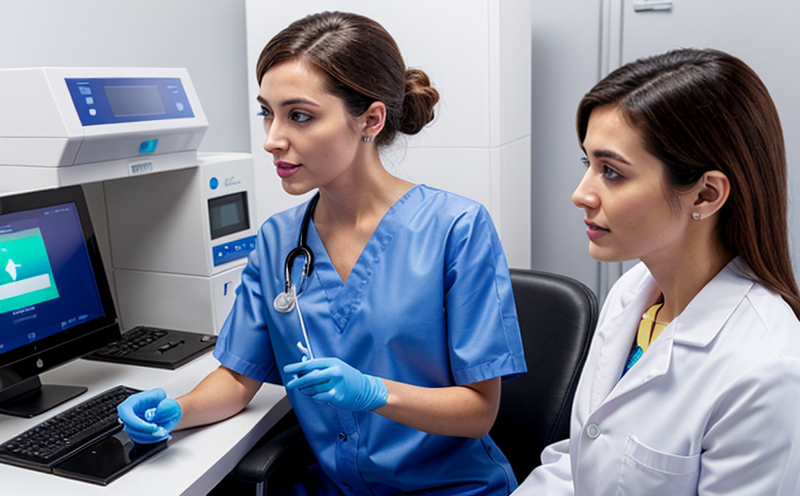PCR Testing for Rabies Virus in Veterinary Samples
The PCR (Polymerase Chain Reaction) testing method is a cornerstone of virology and molecular diagnostics. It allows for the detection of specific DNA or RNA sequences within biological samples, including those from animals. This technique has revolutionized the field of veterinary medicine by enabling early and accurate diagnosis of viral infections such as rabies.
Rabies, caused by the Lyssavirus genus, is a viral disease that affects both humans and other mammals. Once symptoms appear, there is no effective treatment; thus, early detection and intervention are critical for controlling outbreaks. PCR testing provides a rapid, sensitive, and specific means of identifying rabies virus nucleic acid in saliva or brain tissue samples collected from suspected cases.
PCR assays used at Eurolab ensure precision and reliability through stringent quality control measures that comply with international standards such as ISO 15189. These tests are conducted using advanced instrumentation like real-time PCR machines which can quantify the amount of viral RNA present in the sample, providing quantitative results alongside qualitative confirmation.
Sample preparation is essential for accurate PCR testing outcomes. For rabies virus detection, saliva or brain tissue must be collected carefully following established protocols. Saliva samples should ideally contain cells from the oral mucosa where the virus replicates before spreading to other parts of the body. Brain tissues need careful handling to preserve the integrity of viral particles throughout processing and amplification steps.
At Eurolab, we utilize a multi-step process for sample preparation tailored specifically towards rabies diagnosis:
- Saliva samples undergo filtration followed by extraction using appropriate reagents.
- Brain tissue is minced and homogenized before being subjected to nucleic acid isolation techniques.
The extracted nucleic acids serve as templates for the PCR reaction. Primers targeting conserved regions of rabies virus genome are designed to amplify a particular segment unique to this pathogen. This ensures specificity even when dealing with closely related but non-pathogenic lyssaviruses.
Real-time PCR technology allows continuous monitoring of the amplification process, enabling real-time quantification of target sequences directly within the reaction vessel. Results are interpreted based on threshold cycle (Ct) values which reflect the number of cycles required for fluorescence to exceed a predetermined limit indicating presence or absence of viral nucleic acids.
Compliance with relevant regulatory requirements is paramount in our testing procedures. We adhere strictly to guidelines set forth by WHO, OIE, and national health authorities ensuring that results are accepted globally while maintaining high standards locally too.
Eurolab Advantages
Eurolab prides itself on delivering exceptional PCR testing services for rabies virus detection in veterinary samples. Our expertise lies not only in providing accurate and reliable results but also ensuring timely turnaround times, which is crucial in managing potential public health risks associated with rabies.
- Accurate Results: Leveraging cutting-edge technology allows us to achieve high sensitivity and specificity levels required for detecting low concentrations of viral nucleic acids.
- Rapid Turnaround Time: With state-of-the-art equipment and skilled personnel, we can process samples quickly yet maintain quality control throughout the entire workflow.
- Comprehensive Reporting: Detailed reports are generated for each sample tested including raw data, interpretation of results, and recommendations for further actions if necessary.
We understand that time is often a critical factor when dealing with infectious diseases like rabies. Therefore, our commitment extends beyond just performing tests; it includes offering guidance on specimen collection procedures to ensure optimal sample quality upon receipt at our laboratory.
Environmental and Sustainability Contributions
- Eco-Friendly Practices: By minimizing waste through efficient use of reagents and consumables, we contribute positively to environmental sustainability efforts within the healthcare sector.
- Reduction in Antibiotic Usage: Early diagnosis facilitated by PCR testing helps prevent unnecessary antibiotic treatments which have been shown to contribute significantly to antimicrobial resistance issues worldwide.
Through our commitment to sustainable practices, Eurolab aims to play its part in preserving natural resources and promoting healthier ecosystems. Our efforts align with global initiatives aimed at reducing the environmental footprint of healthcare operations while maintaining robust diagnostic capabilities essential for public health.
Competitive Advantage and Market Impact
Eurolab stands out in the field of PCR testing for rabies virus due to our unparalleled expertise, advanced technology, and unwavering commitment to quality. Our services are sought after by numerous stakeholders including governmental bodies responsible for disease surveillance programs, private veterinary practices needing reliable diagnostic tools, and research institutions focused on understanding viral pathogenesis.
Our reputation for delivering accurate, timely results has earned us recognition as a leader in this niche market segment. By providing comprehensive support from sample collection guidelines to detailed interpretation of complex scientific data, Eurolab ensures that our clients have everything they need to make informed decisions regarding rabies management strategies.





